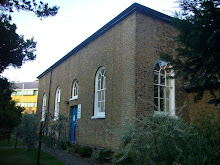Tomson Warner (1738-1816), brassfounder, born in St Albans, son of Jacob Warner (1700-1762) and Ruth Tomson (1712-1778). Settled in London, married in 1770 Mary Applegarth (1744-1777) of Basingstoke, daughter of Robert Applegarth (1701-1775) and Jane Sanger (1706/7-1771) and had two sons and three daughters, one of whom died in infancy. He married secondly in 1782, Elizabeth Tilbury (1757-1791) daughter of Stephen Tilbury of Alton and Elizabeth his wife. There were two sons, one of whom died aged 17, and one daughter. Edward Milligan says in the Biographical Dictionary of British Quakers that he suffered considerable distraint for his refusal to pay tithes, church rates or war tax, but on the other hand was under dealing by Peel MM 1794-5 for unnecesary frequenting of public houses and because "he otherwise demeaned himself in an improper manner." He moved to Uxbridge in 1800 and died there in 1816. His daughter Jenny (b1771) married William Hull in 1794.
John West
Thomas West was an early Quaker from Long Crendon in Buckinhamshire. In a list of Meetings from 1689, his house is listed as a Meeting place. When Thomas and his wife Ann emigrated to America on William Penn's second visit to the colonies, they left behind their son John, at the “great school of the Quakers at Uxbridge”, aged 9.
He went to join his family in America in 1714, and became an innkeeper. When he married for the second time, Sarah Pearson, daughter of a friend of William Penn, John was given a black slave as part of the wedding dowry. He came to love him and depend upon his help, but when he travelled to Barbados and saw how cruelly the slaves there were treated, he was shocked. After conversation with Dr Gammon, one of the community of Friends in Barbados, he was convinced that it was wrong to retain a fellow man in slavery. On returning home he gave the slave his freedom and then retained him as a paid servant.
He then campaigned for the abolition of slavery, which was adopted locally by the Quakers, and then by the Assembly of Philadelphia: in 1753 it was agreed that no Quaker could own a slave and remain a member. The Society of Friends also established schools for the education of the children of slaves.
Friends also organised the underground railway, which helped slaves to escape, and were instrumental in campaigning for the general abolition of slavery.
In 1738, John West and his wife were blessed with nine children already when Mrs West went into labour during ministry by a speaker at her local meeting, and she had to be carried home by the women from the meeting, to give birth to Benjamin West. John West believed that this baby would be special.
When he was six he was left in charge of his neice, and being struck by the beauty of her smile, took up paper and pen from the table and made a drawing of her. The Native Americans didn't come into conflict with the settlers in Pennsylvania. They came and went as they wished, and Benjamin West was friendly with them. They showed him how to make the pigments that they used.
There was some disquiet about his choice of profession, but when he was 16, his Meeting approved art training for him and he studied in Philadelphia and New York city. He was sent to Italy for three years of study, then went to England in 1763 and remained there for life.
Benjamin West abandoned the tradition of painting people in Greek and Roman dress, the first major artist to do so. Among his historical paintings is the famous painting of “Penn's Treaty with the Indians” (1772). He had a profound influence on historical painting in Britain, was historical painter to George III, a founder and president of the Royal Academy. He was offered a knighthood through the Duke of Gloucester, which true to his Quaker upbringing, he declined.
He died March 10, 1820, at the age of 81. He is buried in St Paul's Churchyard.
William Winch
Thomas Wright, married Mary Redding at the George in the first Quaker Wedding, 1677.

No comments:
Post a Comment